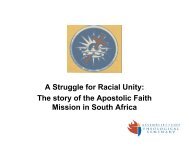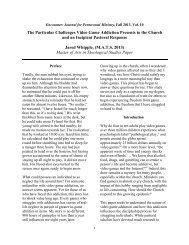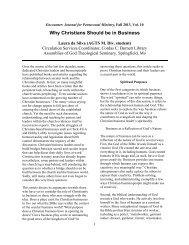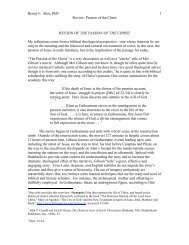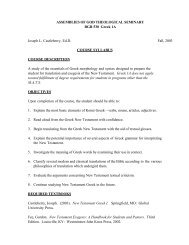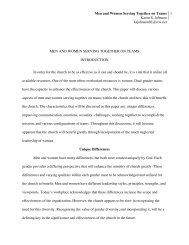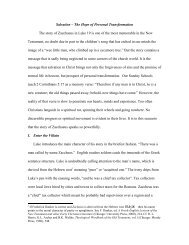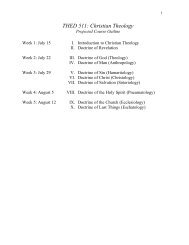Encounter: Journal for Pentecostal Ministry - Assemblies of God ...
Encounter: Journal for Pentecostal Ministry - Assemblies of God ...
Encounter: Journal for Pentecostal Ministry - Assemblies of God ...
Create successful ePaper yourself
Turn your PDF publications into a flip-book with our unique Google optimized e-Paper software.
flesh, needed the Holy Spirit to walk with Him<br />
daily <strong>for</strong> ministry, so do we, but ever more so.<br />
The Trinity and Calvary<br />
After this brief overview <strong>of</strong> three main texts<br />
concerning the personal relationship between<br />
Father, Son, and Spirit at the Cross, we can<br />
unpack the dynamic a little more. 21 Moltmann<br />
sees both the Father and the Son suffering at<br />
the Cross and detects that the divine<br />
consistency is at stake, the inner life <strong>of</strong> the<br />
Trinity. At the Cross, the self-communicating<br />
love <strong>of</strong> the Father becomes infinite pain over<br />
the death <strong>of</strong> the Son. Likewise, the responding<br />
love <strong>of</strong> the Son converts into infinite suffering<br />
over being <strong>for</strong>saken by the Father. What<br />
happens at the Cross reaches into the very<br />
depths <strong>of</strong> the infinite <strong>God</strong>head and, there<strong>for</strong>e,<br />
puts its impress on the trinitarian life <strong>of</strong> <strong>God</strong><br />
<strong>for</strong> eternity. 22<br />
Thus, <strong>for</strong> Moltmann, an almost drastic shift<br />
exists from apatheia (the idea that <strong>God</strong> cannot<br />
suffer) to suffering, which becomes the<br />
<strong>for</strong>emost aspect <strong>of</strong> the trinitarian doctrine.<br />
Moltmann claims that a <strong>God</strong> who cannot<br />
suffer cannot love, and that a <strong>God</strong> who cannot<br />
love is a dead <strong>God</strong>. Thus, a self-imposed<br />
limitation surfaces that makes the relationship<br />
within the <strong>God</strong>head, and with us, meaningful.<br />
<strong>God</strong> has something at stake in all this. 23<br />
Further, this <strong>God</strong><strong>for</strong>sakenness and<br />
patricompassionism are not merely mirages<br />
with which to identify, but rather events that<br />
take place in <strong>God</strong>, a dialectic where He takes<br />
everything <strong>of</strong> the ―far country‖ (all that is<br />
opposed to <strong>God</strong>) into himself in order to<br />
overcome it. 24<br />
Moltmann is not the only theologian taking up<br />
the theme <strong>of</strong> suffering at the Cross. Hans Urs<br />
von Balthasar contends that, in some way, all<br />
Three Persons <strong>of</strong> the Trinity suffer at the<br />
Cross. 25 For Jüngel, there seems to be an<br />
implicit suffering in the very fact that <strong>God</strong> is<br />
love. Barth exclaims, unconditionally, that, as<br />
a sinner, <strong>God</strong> rejects Jesus. Jesus stands not<br />
only under the wrath <strong>of</strong> <strong>God</strong>, but because<br />
2<br />
wrath is necessary, Jesus stands under <strong>God</strong>‘s<br />
sentence and judgment. 26 Further, He knows<br />
that He must perish; He considers that He<br />
must die and, thus, He is not merely in the grip<br />
<strong>of</strong> death, but from the depth <strong>of</strong> His election,<br />
He must constantly hear the voice that<br />
rein<strong>for</strong>ces the knowledge that He is in the grip<br />
<strong>of</strong> death, and that He is lost. 27 The impact <strong>of</strong><br />
this constant inner voice must not be<br />
understated or neglected in the light <strong>of</strong> Him<br />
being the One and only elect <strong>of</strong> <strong>God</strong> in such<br />
communion with the Father and Spirit that this<br />
would indeed be a severe struggle within the<br />
inner-trinitarian life.<br />
The struggle is clearly felt not only on one<br />
side but among both the Father and the Son.<br />
Gérard Rossé points to the non-intervention <strong>of</strong><br />
the Father on the cross as a revelation <strong>of</strong><br />
himself, not despite His silence but because <strong>of</strong><br />
His inactivity. The abandonment <strong>of</strong> the Son<br />
should be seen positively as the culminating<br />
expression <strong>of</strong> the Father‘s love <strong>for</strong> the Son. 28<br />
By not intervening at the Cross, the Father<br />
actually carried out the sacrifice that Abraham<br />
almost did with Isaac, an act that certainly<br />
caused the Father great suffering. John 3:16<br />
says that <strong>God</strong> the Father gave His only Son,<br />
and Brown notices that in this verse, the role<br />
<strong>of</strong> the Father becomes prominent. 29 In this act,<br />
the Father gives His Son and risks, as<br />
Moltmann would argue, the very consistency<br />
<strong>of</strong> the inner-trinitarian life itself.<br />
The Holy Spirit also takes part in this risk<br />
during those few short hours at the Cross. If<br />
the Father risks something by standing by idly,<br />
then the Holy Spirit has just as much at stake.<br />
Jüngel sees the Holy Spirit at the Cross as the<br />
bond <strong>of</strong> love that holds the Trinity together. 30<br />
At such a crucial time, when the unity <strong>of</strong> the<br />
<strong>God</strong>head is most at jeopardy because <strong>of</strong> the<br />
necessary abandonment, the Spirit becomes<br />
the link, the glue that preserves the blessed<br />
unity <strong>of</strong> the Trinity. 31 With Moltmann, one<br />
finds that the Spirit is the link, but he gives<br />
more focus to the communion <strong>of</strong> the wills as<br />
pointing to the Divine Unity at the Cross.<br />
Also, the Spirit <strong>for</strong> Moltmann plays a vital



